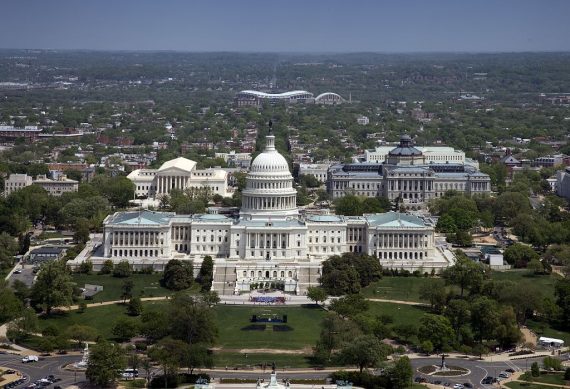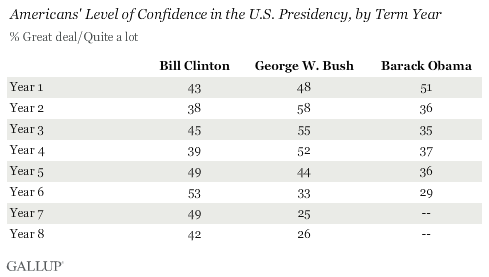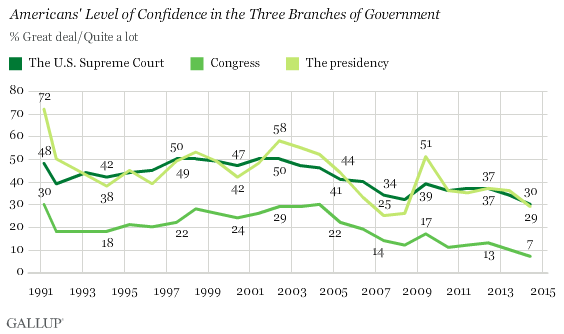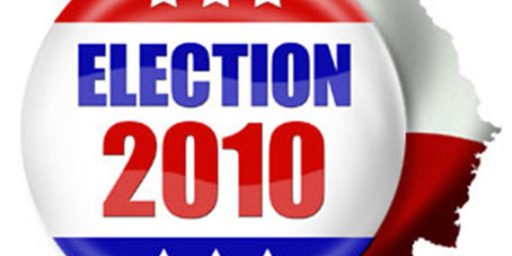Americans Have Almost Totally Lost Faith In Government
Public faith in government institutions is at all all time low.
A new poll from Gallup shows that Americans’ faith in the Federal Government at all levels continues to decline:
WASHINGTON, D.C. — Americans’ confidence in all three branches of the U.S. government has fallen, reaching record lows for the Supreme Court (30%) and Congress (7%), and a six-year low for the presidency (29%). The presidency had the largest drop of the three branches this year, down seven percentage points from its previous rating of 36%.
These data come from a June 5-8 Gallup poll asking Americans about their confidence in 16 U.S. institutions — within government, business, and society — that they either read about or interact with.
While Gallup recently reported a historically low rating of Congress, Americans have always had less confidence in Congress than in the other two branches of government. The Supreme Court and the presidency have alternated being the most trusted branch of government since 1991, the first year Gallup began asking regularly about all three branches.
But on a relative basis, Americans’ confidence in all three is eroding. Since June 2013, confidence has fallen seven points for the presidency, four points for the Supreme Court, and three points for Congress. Confidence in each of the three branches of government had already fallen from 2012 to 2013.
Confidence in the presidency is now the lowest it has been under President Barack Obama, as is confidence in Congress and the Supreme Court, given their historical lows. When Obama first took office in 2009, each of the three branches saw a jump in confidence from their dismally low ratings in George W. Bush’s final two years in the White House.
Indeed, public faith in the Presidency has fallen faster under President Obama than it did under President Bush:
The decline in confidence in the last two decades can be seen most apparently in this chart:
Chris Cillizza calls this the most depressing chart you will see today:
Numbers like these make clear that the “things have always been bad” storyline misses the mark. It is absolutely true that Congress, especially, has never been a terribly confidence-inspiring institution. But the declining confidence in the Supreme Court and the presidency has combined to create a level of distrust with all levers of government that has never been seen before.
What does it mean? That anything coming out of Washington — from either party — is viewed skeptically by a public who have become less trustful of the government while, at the same time, growing more and more polarized along partisan lines. (Those two occurrences are, of course, related.) It also could open the door for candidates — from the presidential level on down — running hard against Washington.
There’s really nothing new or earth shattering in this poll, of course. For some time now we have seen polls that ask people what they think about the job that government in general, and government at various levels, is doing. Consistently, those numbers have been on a sharp and steady decline ever since the later years of the Bush Administration after having risen to fairly high levels in the wake of the September 11th attacks. The reasons for the decline are obvious, of course. Disdain over the Iraq War, the declining economy, and a whole host of other factors contributed to the decline under President Bush, of course, but I’d suggest that what also played a role was the beginnings of the partisan war our political culture has now become. When President Obama took office, those numbers ticked up for a short period of time, no doubt in response to the general optimism in the country that surrounded his election and Inauguration. Fairly quickly, though, they started falling again due, I would suggest, to both the state of the economy and the world and the partistanship that has infected American politics If they continue their current trajectory, then the situation will be even more bleak with President Obama leaves office than it was when his predecessor left office.
The question is when, if ever, this bleak view that the public holds about government will change. Since it seems unlikely to do so while Barack Obama is President, perhaps we’ll see a turnaround when a new President is elected. That turnaround will likely be brief though, especially if Hillary Clinton wins the White House as current polling seems to indicate she will. In that case, the return to partisanship will be swift and the public is likely to react negatively as they are now.









This is indeed not surprising. The teahardists combined with the spinelessness of John Boehner have led to a totally dysfunctional government.
I think a major problem is that there is a disconnect between public preferences and what government does (or, in fact, does not do). Some simple, obvious examples: mass public sentiment was opposed to the debt ceiling crisis/government shutdown, but what did we get? Another example: the public favors immigration reform, and has for some time, and yet…
The degree to which Congress (the House with its lack of competitive electoral districts and the Senate governed largely by minority rule) is actually is able to represent the interests of the public is questionable.
@Steven L. Taylor:
Do you really think people would like Congress more if the Repubicans were redistricted out of existence and the Democratic Party majority are fighting over entitlements and how to pay for them.
Unless the U.S. is in the middle of an economic bubble or in the middle of a war (that we are winning) people are going to hate the government.
Do you really think people would be happier with higher taxes, carbon emission limits, higher energy prices, and more legal immigration?
In the immortal words of Marge Simpson (and she’s been quoted by so many) “Well, duh.”
This is of course predictable, and partly the fault of the American system of government. Unless there is unified government, then one party can easily block all but the most critical legislation from passing. But without passing legislation, the President has nothing to show for his term in office, except whatever he can achieve through executive authority. Obama tried it, but he’s already pushing the boundaries of what’s legal.
The country is still recovering from the financial crisis, and Congress is not doing anything to help. Why would Republicans do that, any credit would go to Obama. So they successfully block any new legislation, which has the double benefit of making Obama look bad AND further eroding American faith in government, which makes them more receptive for the GOP’s anti-government rhetoric.
Separation of powers is at fault, which cannot deal with ideologically unified parties. In a fusion of powers system, the majority party could pass the legislation it thinks will fix the crisis, and if it doesn’t work the public can elect somebody else to try it. But that’s not possible in the USA, and the result is gridlock.
It doesn’t help that there is little electoral accountability. If 90% of all Americans think that Congress has failed but THEIR representative is fine, the electoral system is broken as well.
The problem lies in the state of our two major political parties.
One party (the Democratic Party) believes that government has a role to play, while the other (the Republican Party) believes that it is now time to actually (really) reduce the size and role of government. It has become a zero-sum game with no compromise, but realistically how can you expect compromise from a party has an interest in ensuring that government does not function properly, or that has demonstrated that it is willing to shut down government and countenance default to leverage its demands?
The public is to blame here too. Much of the public likes the government that they avail themselves of and wants a reduction of the government that they do not themselves utilize. Much of the public voted the anti-government faction into power and many are dissatisfied that things are not going well in government? Imagine that.
Seems reasonable. The government totally lost faith in the people some time ago.
@Steven L. Taylor:
The current congress is, arguably, representing the interests of a specific public.
The problem is that this particular public is a reactionary public. And while the American System doesn’t provide the minority with the tools to easily repeal existing legislation, there are more than enough tools to prevent additional legislation from going forward.
Ahhhh, irony….
@Matt Bernius: Yes, but the electoral system and the basic institutional parameters of our system help promote a specific public being represented. (And it is not one that does a good job of representing the overall sentiments of the populace nor does it even create an especially useful public debate about policy).
@al-Ameda: Except that the GOP doesn’t really believe this, either. (See:, e.g., the military and the national security state in general).
But, again: the system forces us into binary choices and other factors, such as gerrymandering (but really, single seat districts) and primaries mean that we don’t have a lot of actual choices.
Doug is possibly math challenged.
The delta-max/min of W. was 33 over 6 years…Obama is currently at 22 over the same time frame.
So what do we have really…absent a debilitating case of ODS?
A Republican led Supreme Court that is activist and legislating from the bench and is at historic lows.
A Congress that is being controlled…in a de facto manner…by obstructionist Republicans and is at historic lows.
And a Democratic President who is not quite as unpopular as his Republican predecessor…and who is to a large extent suffering from guilt-by-association with the other two branches.
Allow Government to grow at the same rate it has under recent Republican Presidents and the economy looks completely different and the Obama Presidency with it.
http://www.nytimes.com/interactive/2012/05/04/business/economy/off-the-charts-shrinking-government.html?ref=economy&_r=0
I’m stunned by the chronic slide in Presidential popularity this chart pins on Poppy Bush. What do you make of that?
Republicans tend to trust one part of the government (the military and to a lesser extent the NSA etc), Democrats another. The number of people who trust all of it is, I suspect, quite small.
@Steven L. Taylor:
We’ve noted before in response to earlier articles that, in the GOP mind, the Department of Defense (and perhaps national security more broadly) is not part of the government. Or, to be more precise — when GOP politicians make a general statement about “the government”, or “government”, they do not intend that statement to apply to the military, the intelligence community, or homeland security.
This can be seen in the pronouncements of politicians who assert, on the same day, that “government never gets anything right” and “we need to give more money to the Navy so that they can build ships”. Who want to give the Air Force more money for F-35s because the program is running way over cost, but who want to take money away from the IRS because they aren’t doing a good job. Etc.
“Get your government out of my military” isn’t far from where these people’s heads are at.
@al-Ameda:
I’d counter the argument of “much” — considering the actual demographic density of many gerrymandered Republican districts. Right now, based purely on population, Republicans are *over represented* in the federal government.
Further, I think this misses a key point. The reason the anti-government crowd is dissatisfied is because *all their reps* have been able to do is to more or less halt the growth of government. What they want them to do is undo/shrink government. There is little possibility of that happening in the foreseeable future. Gridlock *isn’t* enough for them.
@Steven L. Taylor:
Completely agreed. What’s fascinating to see is the ability of a minority of the minority to exert such control over the current system.
Correct. Man, the topic of “how we got here” — and how relatively quickly it happened (within a 30 year window or so) would be one hell of a dissertation topic (actually, probably not — way too broad for a dissertation).
The Gallup poll doesn’t appear to ask about the federal government in general, and there’s only a passing reference to confidence in the military. This is the presidency, the Supreme Court, and Congress. What would be the confidence in the DHS, or IRS, or DoD, or FDA? I’d bet there’s a lot of variation across agencies.
More people losing confidence in government, leads to more apathy when it comes to voting, which leads to even more extremists in government … cycle and repeat. Depressing.
I think this trend, which is a long-term thing, is terrible for the country. It reinforces itself.
And the thing is, the rise in cynicism can be justified. I look back at the “trust” numbers from the past and I can’t help but think “those naive suckers!”
I think we need more trust. Yet, when I contemplate it personally, I can’t muster it up.
@rudderpedals: I’m too lazy to look it up, but I suspect the sharp drop for HW Bush is rebound from a steep bump that’s off the left side of the chart when the Gulf War started .
So McConnell’s plan is working. Basically the GOPs are holding the country hostage. They won’t allow the government to function unless we elect them. @Matt Bernius:
Oops, apologize for the Matt Bernius reference in the previous post. Inadvertent. @Matt Bernius: @Steven L. Taylor: To be explicit, I assume when you speak of a “specific public”, you’re talking about the .01% and their corporate interests.
In Winner-Take-All Politics Hacker and Pierson talk about “drift”. Drift being what we get from a system that makes stopping legislation way easier than pushing it. It becomes very hard to disrupt the status quo. And of course if you are strongly favored by the status quo, drift is something you wish to promote.
@Ron Beasley: of course, you would never lay any blame for this on the proponants of big government. (spit)
The problem is not that too many people have lost faith in the government, but that for too many years, too many people have had too much faith in the government to solve all their problems.
@Mike Moore:
It ebbs and flows. If people find themselves in a position wherein the only thing they *can* do is seek redress via their government, that’s what they will do.
@Ron Beasley:
Boehner is spineless but yet has enough spine to thwart the Democrat agenda, thereby making the government ‘dysfunctional’. How dat?
I’m not a Tea Partier, I’m not even American, but I am sure that calling them Teahardists will convince nobody but your fellow travelers.
By the way, dysfunctional does not mean ‘not doing what I want it to do’.
@Fred Z:
Because the American system of government grants the minority party with significant powers to prevent legislation from happening. And given that the Minority party controls one of the two houses of Congress, that further increases their ability to restrict action.
Hence, when an American party chooses to be reactionary at all costs, they can do a LOT to make government dysfunctional.
The problem they face is while they can essentially stop forward legislation, they are *generally speaking* unable to directly undo existing legislation.*
*- Though there are ways to effectively prevent legislation from being enacted through foot dragging. For example the Republican’s blocking the approval of NLRB members more or less prevented the NLRB from functioning. Likewise, blocking funding can prevent agencies from acting.
What the public sees now is a president threatening to take matters into his own hand, because he cannot get his agenda passed. The reason he cannot get his agenda passed is that the majority of voters and their representatives are dead flat against his agenda. The citizen’s representatives cannot pass corrective legislation, nor can they easily stop funding for essentials. The other half of the Congress is controlled by the opposition party and hence represents a roadblock against any legislation not favorable to the president’s agenda. The House has passed a large number of measures that are in this category, and it stops dead at the Senate door. So who are the foot-draggers?
Obviously both are, because of truly fundamental disagreements between them in virtually every sphere: political; social; financial; military; foreign policy; following the Constitution; you name it! Who are supposed to be the most representative of the People? The House of Representatives are. Of course, if the Senate absent-mindedly passes a misguided, anti-agenda bill, the current president will veto it, so the people’s choice is thwarted by two layers of defense. It is therefore easy to say that “Hope and Change” is either a dead issue, or a set of Executive Orders and Regulations that no majority of citizens wants, but a very small minority of dedicated zealots in this administration are determined to get. Government by decree goes by another name—totalitarianism– yet few on the left are heard to cry for a halt. Que domage!
@mannning:
That is a VERY big supposed to be. It, of course, leaves out the fact that the majority of voters voted for the party that is currently in the decided minority in the House. The state of gerrymandering rather undercuts your point here.
@Grewgills: So you are saying that there ARE NO GERRYMANDERED districts for the Democrats? You really believe that there are more safe gerrmandered districts for Republicans than there are for Democrats? So tell me how many there are on both sides and show me that it is relevant. Even so, the representatives from such districts are formally inducted into the Congressional system and are sworn to uphold their duties to their constituents. That this is wishful thinking, however, can be seen from the block voting they are forced to do by party discipline, which allows passage of bills that do not have the blessings of their constituents, merely the command from their leaders, or else! So gerrymandered or not, the party in power controls the votes and the bills, not the people.
@mannning:
In the last House elections 48.8% of the population voted for a Democrat and 47.6% voted for a Republican yet there are 234 Republicans and 201 Democrats in the House. There is something wrong with that picture.
We need to basically disrupt the primary system. People should be allowed to cast a vote in all party primaries. This will even out the score, Republicans would get a bit more liberal, Democrats would get a bit more conservative, but over all the choice on election day would reflect the majority, not the activist base.
@Rick DeMent: That doesn’t solve the problem that turnout for primaries is skewed heavily towards the activist base.
It also does not solve the problem that the districts in question, gerrymandered or not, are likely to be skewed to one party or the other due to various aspects of geography and demographic patterns.
The problem is single-seat districts themselves (but primaries make the problem worse–primaries of any kind, in truth).
@Grewgills: Agreed.
@Steven L. Taylor:
I agree but I think that it might help keep the biggest reactionaries from either side calling the shots. I think the Mississippi contest is a QED to this idea.
@Rick DeMent: I would also note that primaries in which everyone votes aren’t really primaries any longer (i.e., party-based nominating contest).
We could go to AV (a ranked voting process used to elect the Australian House), but even then it would not create that much of a change. We need more significant reform if the goal is the actually make Congress more representative.
Today’s so-called conservatives should be thrilled with this news, after all, for years they have been trashing the government at every opportunity…their endless anti-government propaganda has worked…
@Grewgills:
Well, yes! The Republicans won more districts, in less populated areas. The Dem base has always been in the cities. Shall we prefer the cities over more surburban and rural districts? Is that what you are after? Something is wrong with that, too!
You showed me no evidence of gerrymandering on either side.
@mannning: The issue is whether each citizens is counted the same. This is a rather key.
@mannning: And yes, there are non-competitive districts that favor both parties. How is this a good thing?
@mannning: One more thing: each congressional district is supposed to be the same size (except in a few cases) so your point doesn’t even make sense.
Mea Culpa! After looking into the redistricting topic in some detail (which I obviously did not do above) I must agree that: 1) Redistricting is a very complex, multifaceted problem; 2) The goal of equal representation is not met in many instances; 3) That cooperative redistricting had preserved the status quo in California, for instance; 4) Rather subtle boundary changes can have significant results for the party in power; and, 5) Packing and cracking of districts is still effective for some states. The factor I did not obtain information on is voter turnout per district, which could be more important than gerrymandering for the final results in a number of cases.